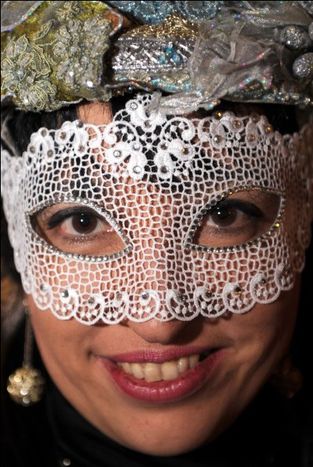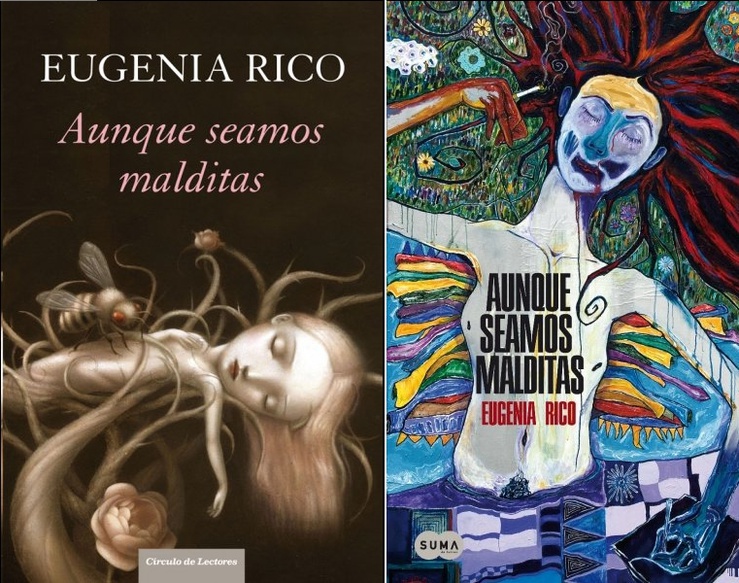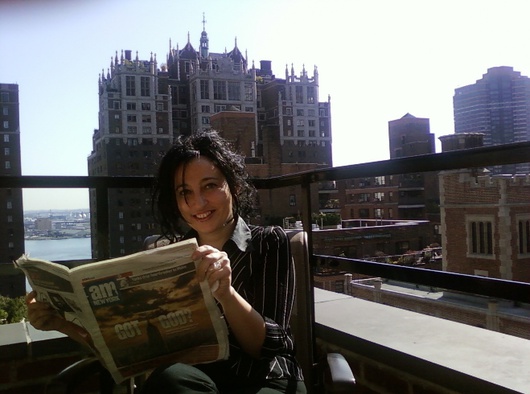
Spanish writer Eugenia Rico: 'proud to be called a witch'
Published on
Translation by:
Cafebabel ENG (NS)The author, poet and journalist from Asturias intertwines the fates of two fictional women across the centuries in her latest novel. In Berlin, we talk witches, twitter and why it’s good to be different
'Every woman has said at least once that she is like a witch, and all women have called another woman a witch at one point or another,' says Ainur, who has been having a tough time of it. She escapes to write her thesis in peace on the Spanish coast. Her dissertation is about a healer called Selene, who she feels attached to not only through geographical proximity. Whilst the main subject of her dissertation was sentenced for being a witch in the seventeenth century, Ainur has been outed as a 'modern witch' in the present. She has won a rape case against her former boss, but as he is also the mayor of her town, she finds herself ostracised from society. Sick of the dark looks and gossip, she dives into the universe of Selene, discovering her inner self as she goes. The two stories have little in common with each other at first glance, but are skillfully interwoven in Eugenia Rico’s fifth novel, which approximately translates to Although We Are Damned. The stigma that her rape has brought gives the protagonist Ainur a different soul, though her flame red hair set her apart as a child already.
Outsiders
'Outsider? Of course, we all are.' The topic is close to Eugenia Rico’s heart. She’s just rushed out of the Cervantes Institute in Berlin where she has given a public reading of her book. After checking her facebook account and writing an email she’s back with us, gesticulating in a wild mix of English and Spanish. 'You‘re an outsider because you’re too beautiful or too intelligent, too big, too skinny or too fat. Anyway we writers always feel different than other people – and we even want to be different! We look at the world from a different perspective. My novel should show that it’s good to be different!'

 Rico is the perfect example of her own thesis; a short glance at her autobiography shows her life has been anything but normal. She won her first literature prize at the age of five in a Coca-Cola competition, whilst her first text was published when she was eleven. 'Reading and writing always came so naturally to me,' she adds. 'I come from this magical tradition of oral storytelling. When I was small my grandmother would always be telling me stories and fairytales.' Rico continued to stack up the literature prizes as she completed studies in law, international relations and theatre studies. German bestselling author Daniel Kehlmann is also a prominent fan of her latest novel. 'It’s my best work so far,' says Eugenia, who has injected twenty years of writing experience into it, hoping that it would be a pleasure to read as well as a work to stir up reflection. 'The novel is only the tip of the iceberg for me. The reader has to find out what lies beyond it themself.'
Rico is the perfect example of her own thesis; a short glance at her autobiography shows her life has been anything but normal. She won her first literature prize at the age of five in a Coca-Cola competition, whilst her first text was published when she was eleven. 'Reading and writing always came so naturally to me,' she adds. 'I come from this magical tradition of oral storytelling. When I was small my grandmother would always be telling me stories and fairytales.' Rico continued to stack up the literature prizes as she completed studies in law, international relations and theatre studies. German bestselling author Daniel Kehlmann is also a prominent fan of her latest novel. 'It’s my best work so far,' says Eugenia, who has injected twenty years of writing experience into it, hoping that it would be a pleasure to read as well as a work to stir up reflection. 'The novel is only the tip of the iceberg for me. The reader has to find out what lies beyond it themself.'
Persecuted women
 Rico has written for Spanish national newspapers such as El País and El Mundo amongst others. She’s a great conversation partner in her interviews, which she uses as updates on her facebook and twitter pages. The role of the media during the rape process is also thematised in the novel, though they don’t come off looking well at all. Are they a curse or a blessing for Rico? 'There's the character of the inquisitor in my novel who suddenly changes his views and becomes the enemy of the inquisition. If the media condemns a person, he or she is condemned forever, even if he or she is later acquitted. But in this day and age it’s quite the opposite too as social media tools such as facebook and twitter helped save people like Sakineh before the courts. The tools are a new reality for me. It’s like the telephone: you can use it to set off atom bombs, or save lives with it. We’re holding a weapon in our hands and we have to learn how to use it.'
Rico has written for Spanish national newspapers such as El País and El Mundo amongst others. She’s a great conversation partner in her interviews, which she uses as updates on her facebook and twitter pages. The role of the media during the rape process is also thematised in the novel, though they don’t come off looking well at all. Are they a curse or a blessing for Rico? 'There's the character of the inquisitor in my novel who suddenly changes his views and becomes the enemy of the inquisition. If the media condemns a person, he or she is condemned forever, even if he or she is later acquitted. But in this day and age it’s quite the opposite too as social media tools such as facebook and twitter helped save people like Sakineh before the courts. The tools are a new reality for me. It’s like the telephone: you can use it to set off atom bombs, or save lives with it. We’re holding a weapon in our hands and we have to learn how to use it.'
Thanks to the grammar in the original Spanish title of the book, Aunque seamos malditas, women are already mentioned in the story from the get-go. Is Rico a women’s writer? 'Women are a symbol for the persecuted,' she says. 'The book has damned men too, but in this day and age it’s often the women who suffer the most. Just as so-called ‘witches’ were murdered in the past, everyday we are still seeing innocent women killed, such as (Iran’s) Sakineh (Mohammadi Ashtiani, whose case was picked up by the international community in outrage at a proposed death sentence for suspected adultery in 2010). Witches apparently fly and have sex with the devil – completely ludicrous accusations that people wanted to believe about women who were simply wise back then. My novel highlights that that is still going on today. It’s not over by a long shot.' Has Rico herself ever called another woman a witch? She laughs. 'No I have not. But 'witch' is a very positive word for me. In English it also means 'wise woman'. I’d be very proud if I were called a witch.'
Image: main Eugenia Rico ©Eugenia Rico via Facebook; video (cc) oshirinchu
Translated from Eugenia Rico: "Es macht mich stolz, wenn man mich eine Hexe nennt"



